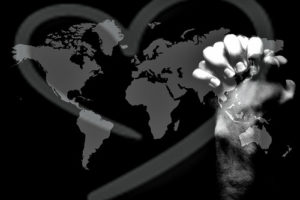A very interesting article floated its way through my Facebook newsfeed this week in which Greg Laurie offers his thoughts on why the United States “the one nation that is strangely absent [from the End Times scenario] is the United States of America.” More specifically, it seems that Laurie is puzzled that it is not mentioned “by name” or by some other definite means of identification. You can find the full article here: http://blog.greglaurie.com/?p=8931
It was a bit nostalgic to read Laurie’s article; it brought me back to a time in my life when such questions were sharply debated, and seemed of paramount importance. Even in that context I remember feeling that this kind of question might be a bit off the mark, and led to some very odd readings of scripture. For instance, Isaiah 18 was sharply debated. Where could this land of “whirring wings” be, that the rivers divide? US attack helicopters, of course, were the best interpretive option, for some, of “whirring wings.”
In those days attack helicopters often came to the aid of the stumbling exegete of the eschaton.
That’s a bit tongue in cheek, but what I really want to write about is the whole logic of the question which is based on an assumption:
The USA is so important that nothing really serious could happen to the planet without her being mentioned.
Laurie offers three explanations for why this could be so. The USA could get nuked, it could decline as a superpower because of “rot from the inside,” or it could experience such a great revival that the Rapture decimates our influence. Each explanation tries to explain how such an important country as the USA could stop being so important.
I want to re-examine this assumption itself, first through the lens of this kind of eschatological reading, and then from some wider perspectives. It is quite likely that Laurie’s whole reading of how eschatology works is wrong, but even if it isn’t, or you don’t think it is, I still think the underlying assumption is deeply flawed and perhaps a bit dangerous. I think it fair to examine this assumption first from “the inside,” as it were, before moving on.
At first this seems like a very sensible assumption. The USA is the last and only great superpower (arguably) and as such exerts hegemonic power over most of the globe. We have also been highly conditioned to view the USA as the saviour of the world, whether that conditioning comes in the form of mass media (Will Smith’s classic Independence Day springs immediately to mind), a selective retelling of history, particularly that of 20th century, or even from the pulpits of so many patriotic churches. This leads naturally to the solutions proposed by Laurie, which, again, are all solutions that describe the decline and/or fall of the USA from its privileged position.
There are two problems, as I see it, with this assumption. One is with the assumption itself and the other with the implication of the assumption on how we read the Bible.
First, Americans have to come to terms with the fact that we might not be as important as we think we are. Yes, we have more money than everyone else. Yes, our military could take all comers. Yes, we have many noble (Enlightenment, deistic, increasingly anti-Christian) ideals. And yes, there are certainly a lot of fine Christians in the USA. But what does all this amount to in the eyes of God? Should we think that all of this is so impressive that we warrant some special mention in his holy Word? Are we so arrogant to be actually confused by our absence? It would seem so, and this insistence on pride of position should make us ashamed. Humility is not just for the individual’s assessment of himself, but for the assessment of the wholes in which we find ourselves participants. The fact that the USA is not mentioned by name in the Bible should humble us, and place the vanity of our neo-Babel construct in perspective.
Second, if we are willing to admit that our insistence on specific mention is a bit pompous then it is possible to find the USA all throughout “End Times” prophecy, if you accept it as such. Where, then? The answer comes easily enough: among the nations. I won’t bury the reader in quotations (there are quite a few!) but end with the second Psalm, one which I think more than all the patriotic propaganda should effect, and affect, us:
1 Why are the nations in an uproar
And the peoples devising a vain thing?
2 The kings of the earth take their stand
And the rulers take counsel together
Against the Lord and against His Anointed, saying,
3 “Let us tear their fetters apart
And cast away their cords from us!”
4 He who sits in the heavens laughs,
The Lord scoffs at them.
5 Then He will speak to them in His anger
And terrify them in His fury, saying,
6 “But as for Me, I have installed My King
Upon Zion, My holy mountain.”
7 “I will surely tell of the decree of the Lord:
He said to Me, ‘You are My Son,
Today I have begotten You.
8 ‘Ask of Me, and I will surely give the nations as Your inheritance,
And the very ends of the earth as Your possession.
9 ‘You shall break them with a rod of iron,
You shall shatter them like earthenware.’ ”
10 Now therefore, O kings, show discernment;
Take warning, O judges of the earth.
11 Worship the Lord with reverence
And rejoice with trembling.
12 Do homage to the Son, that He not become angry, and you perish in the way,
For His wrath may soon be kindled.
How blessed are all who take refuge in Him!
I think that it is high time that Americans, both those who adhere to a “Left Behind” eschatology and those who do not, come to grips with the fact that our nation is one, only one, among many nations of the past, present, and future. Pride of place in the eyes of God is not granted because of the military might, economic surplus, or righteousness of the people but by His sovereign Election. And this election is quite explicitly not now one of geopolitical associations or ethnic identity, but rather is expressed and manifested in identification with His Son. This election transcends our secular boundaries and ought to destroy our mundane patriotism.




 Lee J Haywood is licensed under CC BY-SA[...]
Lee J Haywood is licensed under CC BY-SA[...] 
8 Comments
Leave your reply.